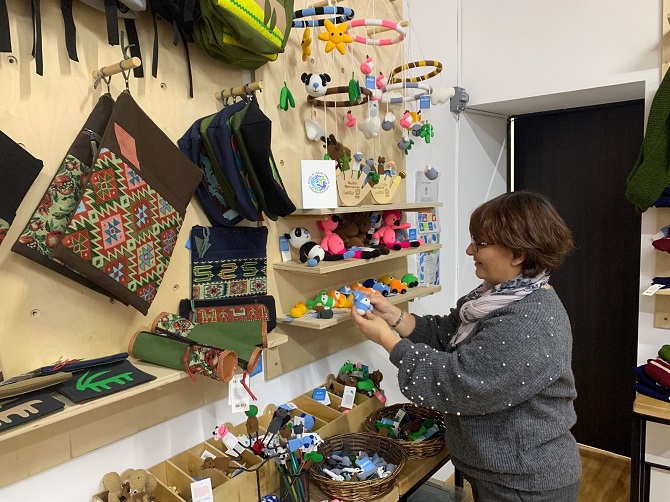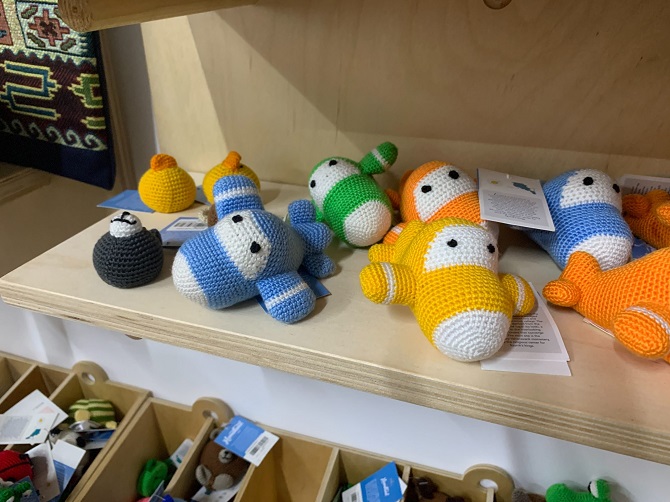The Armenian Weekly. With Christmas only three weeks away, crocheted gifts from Armenia are flying off the shelves from Yerevan to Los Angeles. Two tags stick out from many of these hand-knitted gloves with Armenian carpet motifs or coffee cozies. The first contains a fair trade certification, while the other displays the Homeland Development Initiative Foundation logo.
The Homeland Development Initiative Foundation (HDIF) traces its beginnings to a humble initiative in 2010 by Honorary Consul of Norway and Finland Tim Straight. Drawing from his long career in humanitarian work, the diplomat looked to provide sustainable employment for Armenia’s most vulnerable social groups—women in rural areas and people with disabilities—while also preserving traditional crafts.
HDIF’s first big project came out of an initiative by one enterprising Peace Corps volunteer posted in the border town of Berd. Straight picked up the volunteer’s concept for a teddy bear design that could be knitted by the women of the surrounding communities and sold through HDIF’s distribution channels, thus securing stable income for the 40 women at the Berd Women’s Resource Center.
Today, HDIF provides direct employment for over 175 women from vulnerable backgrounds and people with disabilities in 13 communities across Armenia. Their product range has equally expanded with each of the local partner organizations specializing in a specific product. Berd is known for the Berd Bears. The town of Vardenis has transformed into a miniature tote bag manufacturing hub, while the women in Gyumri have developed a veritable expertise in the art of crocheting baby rattles.
Read also
An experienced toy designer in his own right, Straight conceives, meticulously tests and issues designs for each new handicraft to the respective partner organizations. HDIF also provides all the raw materials. Most artisans work from home but coordinate with their local partner organization for design standards and materials in an authentic cottage industry setup that would make Thomas Jefferson proud. “We test everything from the yarn we provide to the smallest components in labs to ensure that they are safe,” explains HDIF’s Lucy Vartevanian, continuing, “Our children’s toys in particular are evaluated and rated to European and US standards” to sell in western markets.
HDIF does not provide any financial assistance to its partner organizations, but it does provide other forms of support, like management training, accounting services and access to foreign markets. While HDIF does distribute all the profits from sales back to the artisans, it retains intellectual property rights on the designs themselves.
Vartevanian points out that HDIF is the first, and so far only, organization in the entire South Caucasus region to gain membership in the World Fair Trade Organization (WFTO). Membership requirements are quite rigorous. Applicants must be able to prove that they abide by the 10 principles of fair trade: (1) create opportunities for economically disadvantaged producers; (2) transparency and accountability; (3) fair trading practices; (4) payment of a fair price; (5) ensuring no child labor and forced labor; (6) commitment to non-discrimination, gender equality, freedom of association; (7) ensuring good working conditions; (8) providing capacity building; (9) promoting fair trade; and (10) respect for the environment.
The modern fair trade movement traces its roots to early attempts in the 1960s to challenge both the perceived exploitative business practices of multinational corporations operating in developing countries, while also providing an alternative to humanitarian aid. Alternative trading organizations sprang up across the globe which would ensure that workers would be properly compensated for their labor, while commerce would be conducted in a sustainable fashion.
In order to ensure the ethical purchasing of goods originating from the global south, fair trade certification marks have been developed to label products which were produced sustainably in safe environments, without child or slave labor and at a fair price.
Still, despite their inception as an alternative to both aid and predatory commerce, fair trade practices have a tendency to straddle the line between charity and business. For much of HDIF’s history, it’s been closer to the former. However, over the years, the HDIF team has managed, through much trial and error, to perfect its business model, streamline its distribution funnel and expand its global reach with brand ambassadors across Europe and North America.
HDIF products have been sold in a number of locations across Yerevan for years, including the local chain of Green Bean coffee shops. The Foundation also briefly experimented with selling its products in their own Homeland Handicrafts branded brick and mortar store in downtown Yerevan, but as Lucy points out, “Simultaneously running a store and a social enterprise made it too hard to fulfill our obligation towards our producers.” A partnership to put HDIF products on shelves at the Zvartnots Airport gift shop has proven more successful, however.
Recently, the organization has gotten within reach of a milestone that few fair trade projects have seldom achieved: remaining true to its ethical practices while achieving financial self-sustainability. While HDIF initially relied on small batch sales, empathy from the diaspora and large amounts of luck have led to the organization beginning to operate more like a business. A for-profit subsidiary, HDIF Trading LLC, was spun off in order to participate in children’s toys trade shows in Europe and to move towards export markets.
“We shouldn’t expect to rely on the diaspora as our sole customer anymore,” insists Vartevanian. “That’s why we’re refocusing our export strategy towards the rest of the world.” Since taking over as executive director of HDIF’s Trading LLC in January, the Cypriot-born British repat has been turning her vision of a scaled-up, export-oriented fair trade handicraft industry into practice. This strategy has so far paid off, as HDIF has signed bulk outsourcing agreements with major fair trade distributors in Germany and Italy.
The new business-minded approach has rubbed off on HDIF’s local partners as well, who have now gotten used to meeting strict deadlines and standards and adapting to a more professional working relationship.
The move has also compelled HDIF to reevaluate its current product line. “We track data on all our products,” says Vartevanian. “This gives us a good picture of which products are more popular. We use this valuable insight to tweak our production.” Vartevanian is also implementing a system of product rotations between the various partner organizations to help insure standardization across the regions.
For both Straight and Vartevanian, the next challenge is to ensure that the majority of materials in their products get locally sourced in Armenia. At the moment, plastic components as well as yarn are imported in bulk from China. “We’ve always agreed that the yarn could and should be produced in Armenia,” Vartevanian explains. However, the native breed of Armenian sheep are known for their semi-coarse wool, which can be difficult to harvest for textiles. Wool production in Armenia is still in its infancy as various international investors are working to boost the country’s wool manufacturing capacity.
For HDIF and for the artisans they promote, the key to sustainability lies in establishing Armenia as a global hub for quality crocheting. “Crocheting should be as synonymous with Armenia as engineering is to Germany or leather is to Italy,” says Vartevanian.
This week, HDIF launched its Year End donation campaign which will run until the 31st of December. The organization hopes to invest the collected funds to provide more training for local producers with a particular focus on price structuring, capacity building, and meeting WFTO standards.



























































